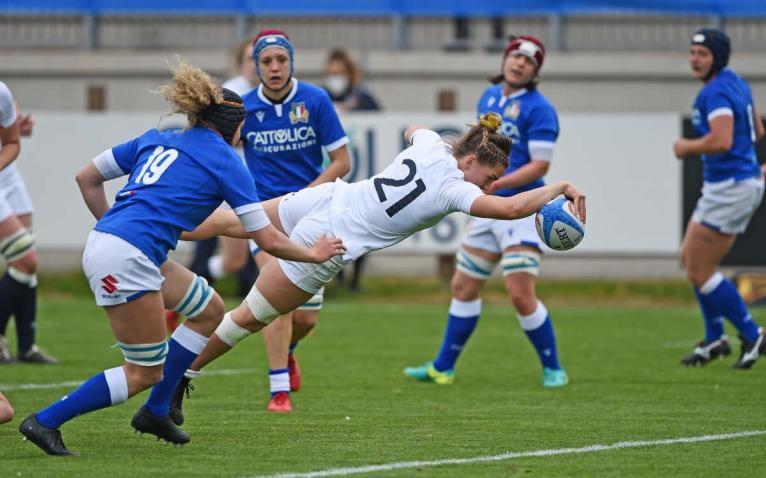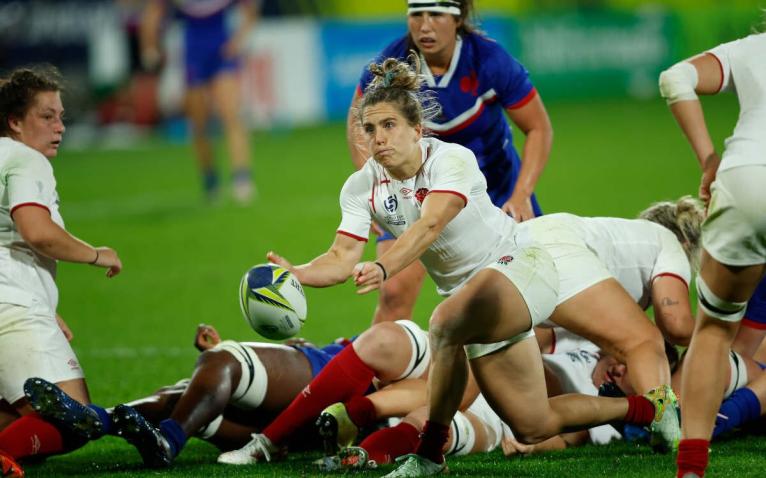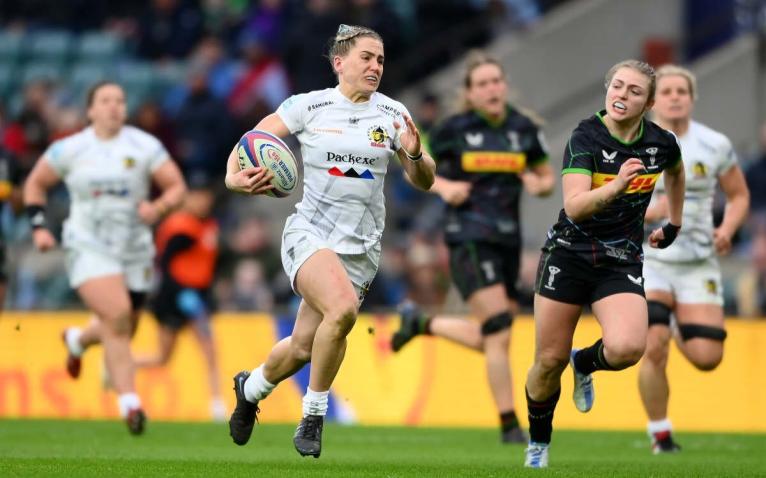We’re half an hour into our conversation and Claudia MacDonald hasn’t stopped smiling. Despite some signal issues which cause temporary breaks in the video call, it’s been an absolute joy speaking to the England scrum half-turned-winger with 24 caps. But I’ve got to ask, is she always this upbeat?
“I wouldn’t say always,” she says with a laugh. “I’m in a good place. Life is good. I’ve learned to let go of the things I can’t control and to focus on the one percent things that I can control. Every day I’m trying to be a little better. I’m grateful to be where I am.”
At present she’s in her car. She’s just finished a training session with England and has been named in the starting XV to take on Scotland in the opening game of her country’s Six Nations title defence.
She’ll be wearing 11 on her back. And though she’d rather it was 9, as she’d spent most of her early years honing her abilities at the base of the pack, she’s content with whatever number sits between her shoulder blades.
“I played scrum half recently and someone described me as a ‘winger slotting in at scrum half’. I immediately felt a knot in my stomach. I was like, ‘I played scrum half for four years! I’ve played for England there. I played in a World Cup final there’. I really tried to make it work there but I’m okay with the change.
“I love playing on the wing, I think. I probably see the game more naturally from the wing and if I’m honest I’m probably better there. I’m just happy to be out there, playing for my country and with my friends. That other stuff, that stuff you can’t control, that’s ego. That’s the sort of thing that makes you lose focus.”

That MacDonald is still a professional rugby player is cause for celebration. In June 2021, while training with England, a cluster of burly forwards collapsed on top of her, crushing her neck. She played on, but after a match a few weeks later she started feeling pins and needles down her back. MRI scans soon confirmed that she had sustained damage to her spinal cord. She was told she might never play rugby again.
“That was devastating,” she says, only briefly deviating from her otherwise ebullient tone. “I made plans outside of the game. I accepted a cool job in London. I was ready to walk away even though of course I didn’t want to.”
She was told that surgery was necessary. But that was risky as surgeons would have to enter her neck through her voice box. And so, after a second opinion, she opted to wait and see. Perhaps her body would heal itself. She decided to accept that some things were beyond her control.
I’d built myself to be a rugby player. That was my life. That was my whole identity. All my friends knew me as a rugby player and it’s what they wanted to talk to me about. When that goes, what’s left?
She stayed tethered to the sport. She served as the water carrier for her former Wasps teammates. She dabbled in commentary during last year’s Six Nations. And when an England team doctor told her that her body had indeed shown positive signs, she returned to contact training.
“It was funny because when I came back, it was obviously amazing, and it’s all I wanted, but I’d had my perspective changed when I thought I’d lost it,” she says. “I’d built myself to be a rugby player. That was my life. That was my whole identity. All my friends knew me as a rugby player and it’s what they wanted to talk to me about. When that goes, what’s left?
“There were times where I was scared of being a normal person, which sounds ridiculous, I know. It’s not like it’s rugby players and everyone else, but I had this sense that I wouldn’t be me anymore.
“I got over that and accepted that I was more than just a rugby player before I was told I could return. So when I got the good news I came back with this greater appreciation. I know now that this doesn’t last forever and that you’ve got to enjoy every moment of it. I think I probably train even harder now than I did before.”

This is why it’s easy to believe MacDonald when she says the disappointment of a World Cup final defeat doesn’t pinch so hard. She was a 51st minute substitute that day in Auckland back in November when the Black Ferns roared back to claim a 34-31 victory in what remains the most watched women’s rugby match in history.
“I don’t remember much from the game itself, to be honest,” MacDonald says. “My most vivid memory is from just before kick-off. Standing there for the anthems, in front of a packed crowd, the noise was just incredible. I remember thinking at the time, ‘This is amazing. This is what we’ve worked so hard for.’
“I know how this might sound but when I hold that memory, the result is almost less important. Of course we wanted to win. I was gutted that we lost. I’m still gutted that we lost. But nothing can take away that moment I had before kick-off. It makes me want to experience it again and again and hopefully I’m still here when we host the World Cup [in 2025].”
Of course, MacDonald has other mementos she brought back from New Zealand. She doesn’t have the match ball from England’s 84-19 group stage win over Fiji, despite scoring four tries in the game. “I didn’t know that taking home the ball for a hat-trick was the tradition,” she says. “But I got other bits that I keep in a box. I haven’t opened it. Maybe I will when I do properly retire.”
“We’re part of a legacy. We’re only here a short while and we never know when it’ll end. We could get injured or someone better might come along and take your place.”
Her most prized possession is a red rose which is pressed in a journal she keeps. Every player in the England team received one from a predecessor who wore the jersey when the sport was still played by amateurs.
“We’re part of a legacy,” MacDonald says. “We’re only here a short while and we never know when it’ll end. We could get injured or someone better might come along and take your place. But while you’re here, you have this responsibility to the jersey. It’s our job to make this legacy sustainable.”
That word, ‘sustainable’, is not shoehorned into the conversation. It is repeatedly raised by Macdonald who has positioned it at the forefront of her consciousness.

She runs a blog called ‘Let’s Talk 1%’ which is a clarion call for readers to make incremental changes in their life to help combat the effects of the climate crisis. Drawing on the teachings made popular by David Brailsford, MacDonald says that even the smallest alteration can make a difference.
“I think a lot of people in the climate space or the sustainability space can be judgmental and that can turn some people off,” she says. “So rather than position it as something that’s all or nothing, I try to encourage people to do what they can.
“Like, if you want to call yourself a vegetarian who occasionally eats bacon, then go for it. That’s better than doing nothing. It’s not a competition. Whatever change you make is still positive. Turning your life around in one day can be difficult. Instead you make a change and that becomes normal. Then you make another one. After two years you’re living a different life because of these incremental changes.”
My mum passing away when I was 17 definitely impacted me and showed me that some things are bigger than others. I think moving down the coast has also chilled me out a bit more.
I ask if her injury helped shape her world view. “Yes and no,” she says. “My mum passing away when I was 17 definitely impacted me and showed me that some things are bigger than others. I think moving down the coast has also chilled me out a bit more. But I’ve always been like this. I remember when I was younger I’d go round turning the tap off when my siblings were brushing their teeth. I just hate waste.”
Which is why she’s trying not to waste another moment obsessing over the past or worrying about the future. Her surroundings have helped her stay in the present. She’s swapped London – “Where you get, like, five seconds at a green light before someone hoots at you” – for Devon where she now plays for Exeter Chiefs.
There she shares a dressing room with her partner, the Irish hooker Cliodhna Moloney, who is a willing recipient whenever MacDonald has a new idea on how to live a more sustainable life.
“She grew up on a farm in Ireland so she’s ahead of me on some fronts,” MacDonald says. “It’s incredible having her as a teammate. That’s one of the things I was most sad about losing when I thought I’d played my last rugby game. I love every moment we have together on the field.”
England play Ireland in round four of the tournament on 22 April in Cork. Moloney isn’t part of the squad so won’t be there. MacDonald might not be either. This is a precarious business where every act carries a degree of risk.
MacDonald understands this better than most. She’s come to accept that some things are beyond her control.


Comments
Join free and tell us what you really think!
Sign up for free